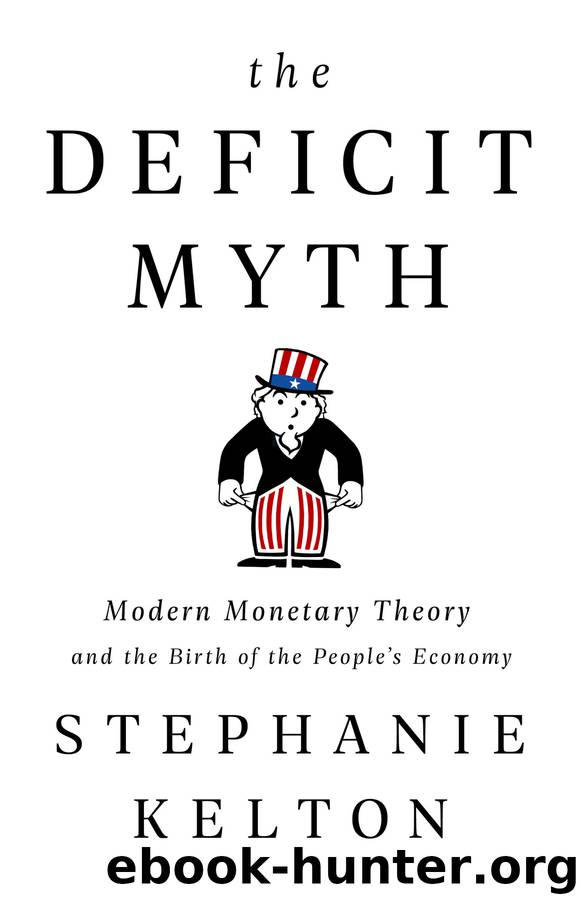The Deficit Myth by Stephanie Kelton

Author:Stephanie Kelton [KELTON, STEPHANIE]
Language: eng
Format: epub
Publisher: PublicAffairs
Published: 2020-06-09T00:00:00+00:00
Other Entitlements Are Also in Danger
I’ve spent a lot of time talking about Social Security because its financial structure illustrates how the deficit myth leads to poor decision-making and can undermine social goals. But the arguments over Social Security’s finances have also helped reinforce misguided thinking about other entitlement programs, especially the persistent belief that they’re becoming increasingly unaffordable.
It’s true that entitlements make up a large percentage of federal spending today, but this isn’t the first time that’s been true. After the Civil War, the federal government provided pensions to disabled, impoverished, and elderly Union veterans and their families. By 1910, 28 percent of all men over sixty-five and more than three hundred thousand widows were receiving federal benefits.34 In the three decades between 1880 and 1910, the federal government spent more than one-fourth of its budget on entitlements. This early entitlement plan has had a long life. As of 2017, the daughter of one Civil War veteran was still receiving her benefits!35
Federal entitlements grew again during the Great Depression, with the creation of Social Security and programs to address widespread unemployment and poverty. There were alarmists then, too. Senator Daniel Hastings said that Social Security “may end the progress of a great country and bring its people to the level of the average European”36—an ironic statement today, given Western Europe’s stronger safety net.
When Medicare was created in 1965, during the postwar economic boom, the debate focused less on government spending and more on fears of socialism raised by Ronald Reagan37 and others. Medicare was also mocked as overly generous by opponents like Republican senator and presidential candidate Barry Goldwater.38 “Having given our pensioners their medical care in kind,” said Goldwater, “why not food baskets, why not public housing accommodations, why not vacation resorts, why not a ration of cigarettes for those who smoke and of beer for those who drink?”
Goldwater’s questions were rhetorical, of course. Others raised more legitimate concerns. “Will there be lines of old folks at hospital doors,” a New York Times reporter wondered, “with no rooms to put them in, too few doctors and nurses and technicians to care for them?”39 As it turned out, there were no lines of old folks wrapped around the hospital doors, but it’s always important to think about whether our economy has the productive capacity to deliver the real benefits—such as doctors, nurses, hospital beds—needed to adequately handle the demand created by government programs.
As the fiscal debate moved rightward, Medicare’s opponents increasingly shifted their objections to the program’s financial affordability. A 2012 op-ed offers many of the typical arguments. “If we do not reduce the growth rate of health-care costs,” an investment banker wrote, “they will consume the federal budget. We risk a debt crisis rivaling the 2008–09 crash.”40
Gail Wilensky, a former adviser to the first President Bush, claims that Medicare “is not sustainable in its current form,” adding that “aging baby-boomers,” along with “any increase from the historically low spending per capita will require some combination of benefit cuts, eligibility changes, cost-sharing increases, tax increases and reductions in payments to providers.
Download
This site does not store any files on its server. We only index and link to content provided by other sites. Please contact the content providers to delete copyright contents if any and email us, we'll remove relevant links or contents immediately.
The Secret History by Donna Tartt(16623)
The Social Justice Warrior Handbook by Lisa De Pasquale(11489)
Thirteen Reasons Why by Jay Asher(7788)
This Is How You Lose Her by Junot Diaz(5772)
Weapons of Math Destruction by Cathy O'Neil(5037)
Zero to One by Peter Thiel(4824)
The Myth of the Strong Leader by Archie Brown(4789)
Promise Me, Dad by Joe Biden(4447)
Beartown by Fredrik Backman(4418)
Stone's Rules by Roger Stone(4415)
How Democracies Die by Steven Levitsky & Daniel Ziblatt(4398)
The Fire Next Time by James Baldwin(4342)
100 Deadly Skills by Clint Emerson(4077)
A Higher Loyalty: Truth, Lies, and Leadership by James Comey(4032)
Rise and Kill First by Ronen Bergman(4012)
The David Icke Guide to the Global Conspiracy (and how to end it) by David Icke(3881)
The Farm by Tom Rob Smith(3872)
Secrecy World by Jake Bernstein(3782)
The Doomsday Machine by Daniel Ellsberg(3731)
